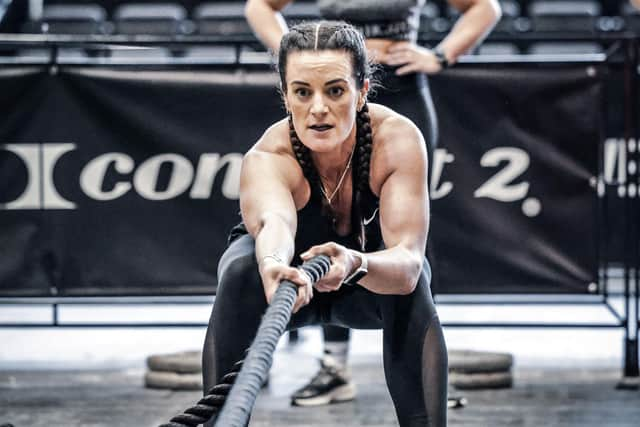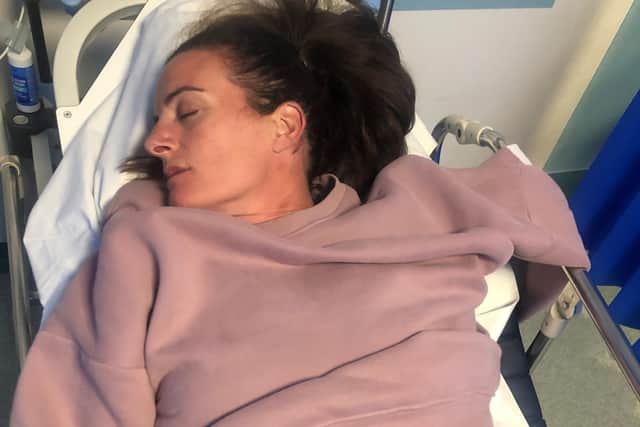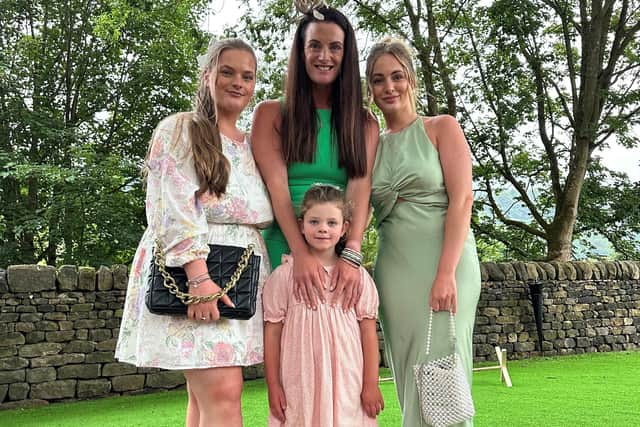Tadcaster woman tells of stroke despite a life in the gym, running and swimming as Stroke Association releases new data
The Stroke Association says that despite 54 per cent of people it surveyed knowing someone who has had a stroke, there is still a common public misconception that the condition only affects older people, when in fact one in four strokes happen to people of working age.
The charity has released its data ahead of World Stroke Day (Sunday, October 29), to warn that not only can stroke affect anyone at any age, but that young stroke survivors are missing out on significant milestones in their lives as a result.
Advertisement
Hide AdAdvertisement
Hide AdFor Lucy Allen, 44, from Tadcaster, it has been the mental health effects that have had the biggest impact on her following a stroke in June this year.Before her stroke, Lucy was hugely active – going to the gym every day, running, swimming and even taking part in elite fitness competitions. However, all of that changed when she began having "visual disturbances” following a gym session.


Initially doctors told her it was a migraine and to go home.
However, after things got worse and Lucy began to feel more clumsy and was struggling to find her words, she was taken to A&E.
Lucy said: “My husband took me to hospital on both occasions. The first visit, the TIA (transient ischaemic attack) was misdiagnosed as a migraine, even though I had no headache. Six days later I was back, and I remember looking and pleading with my eyes to the doctors to help me – I couldn’t speak!“They kept me in and on the second day I was sent for a CT angiogram and then a CT scan which confirmed the dissection in my left internal carotid artery and left MCA (middle cerebral artery) territory infarct. I was then transferred to the stroke unit.”While Lucy’s face was initial drooping and her speech was gone, these quickly improved and luckily she was still mobile. However it has been the dramatic changes to her life and the damage to her mental health that have the hit the hardest.Lucy said: “The hardest part of my recovery has been accepting what has happened. I was told no driving, no working, no going to the gym, no picking up my youngest daughter. I basically felt like my world as I knew it had come to a screeching halt. The mental impact after my stroke has and is the hardest part of my recovery and it never leaves me, every day still - I became very depressed and was grieving for the person I was.“I know I have been very lucky in many ways, the drooping of my face quickly corrected itself for example. My speech got better every day and most people now wouldn’t even know I had a stroke, although mentally it is hard for me every day.”Lucy now wants to share her story to show others that strokes do not discriminate because of age while highlighting the hidden effects of a stroke – even if someone looks “fine”.She said: “I want people to understand that strokes can happen at any time, to any one of any age. Stroke doesn’t always affect people on the outside, to most people they would look at me and never guess I had a stroke only a couple of months ago.“The impact of your brain is not to be underestimated either. The tiredness, confusion, the concentration and the mental impact – just because you can’t see it doesn’t mean it’s not there. It is one of the biggest causes of my anxiety too, especially as I am getting back into work. There are so many questions – it’s a scary place being anxious about it happening again.“I have also just started going back to the gym which has done wonders for my mental health. I honestly think my fitness really did help in my recovery. Reading other stroke survivors experiences and hearing about their recoveries has been really helpful and I want to share my story and help others too.”
Advertisement
Hide AdAdvertisement
Hide AdThe charity also carried out a survey of over 2,800 stroke survivors, which found that a quarter of young stroke survivors aged 18 to 60 feel their stroke has “robbed them of their future”, says the association.


Over a third of survivors aged between 18 to 60 (37 per cent) said that before their stroke, they didn’t think strokes happened to people of their age. While over half of these young stroke survivors (56 per cent) say their stroke has prevented them achieving an important life goal, such as progressing their careers or starting new relationships.
For survivors aged 18 to 60, the Stroke Association’s survey revealed: over half of stroke survivors said their stroke had negatively impacted their careers, and stopped them getting a job, being promoted or changing career; quarter of stroke survivors said their stroke had stopped them achieving their dream of going travelling; around 16 per cent of survivors said their stroke had stopped them from making new friends.
More than one in ten (11 per cent) said their stroke prevented them from gaining new qualifications.
Advertisement
Hide AdAdvertisement
Hide AdNine per cent said their stroke has stopped them finding a partner.


In addition, almost two thirds of those surveyed (62 per cenr) said they now feel like a different person since their stroke. The effects of stroke are often devastating, with lives changed in an instant and survivors often left with serious long-term health issues. The research found that three quarters (78 per cent) of stroke survivors aged 60 and under are struggling with fatigue since their stroke, while almost two thirds are living with depression or anxiety.
More than half of respondents aged 60 and under (58 per cent) now experience one-sided weakness, while almost two thirds (63 per cent) are living with memory problems following their stroke.
There are over 100,000 strokes each year and 1.3 million stroke survivors living in the UK today, with these numbers only set to grow. With an increasing number of people surviving stroke and an ageing population, by 2035, the number of stroke survivors living in the UK is expected to rise to over two million, says the charity.
Advertisement
Hide AdAdvertisement
Hide AdThe estimated overall cost of stroke in the UK is set to rise from £26 billion in 2015 to £75 billion in 2035, an increase of 194 per cent over 20 years, presenting increasing societal challenges in future, adds the charity.
The Stroke Association is aiming to raise awareness of the support it provides for stroke survivors of any age across the UK, to help rebuild lives and support stroke survivors to achieve their life goals.
Alexis Kolodziej, Executive Director at the Stroke Association, said: “Our research highlights that people still think stroke is a condition that only affects older people. It’s crucial that we challenge this misconception and make people aware that stroke affects young adults too.
“Stroke simply shouldn’t be a key milestone in a young adult’s life. When planning for the future, no one prepares to have a stroke. Yet one in four strokes happen in people of working age and around 400 children have a stroke in the UK every year.
Advertisement
Hide AdAdvertisement
Hide Ad“After a stroke, life changes in a flash. Two thirds of people who survive a stroke find themselves living with a disability. As a result, young stroke survivors are having important milestones and their planned futures stolen from them, while they have to learn to adapt to their new life affected by stroke.
“At the Stroke Association, we know the value that life after stroke support plays in rebuilding lives. A stroke doesn't have to stop you from doing the things you want to do. The Stroke Association provides support that covers every aspect of a survivor’s recovery, so you are not just living to survive, but able to live life again.”
The UK-wide population statistics are based on a nationally representative online survey conducted by 4Media among 1,001 respondents in September.
The Stroke Association additionally surveyed 2,858 stroke survivors from across the UK, with 971 respondents aged 60 and under.
Advertisement
Hide AdAdvertisement
Hide AdIf you know a stroke survivor of any age, visit stroke.org.uk/worldstrokeday to find out more about support available and ensure they don’t miss out on important life milestones. To find out if any of our services are available in your area, you can use the charity’s search tool or call the Stroke Helpline on 0303 3033 100.